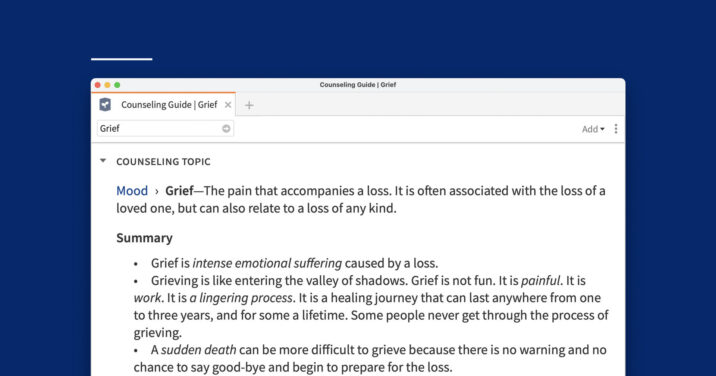As a first-time counselor at a Christian camp this past summer, I recognized the importance of having a full “toolbox” to draw from while speaking to the campers entrusted to my care. There were several times when I could quote a verse but failed to recall its reference. Or sometimes, when I remembered the general content of the verse I wanted to quote, its precise wording slipped from my memory at the moment I most needed it. I felt my greatest discouragement when I could not even think of where in Scripture to turn to while discipling a struggling soul.
I’m sure anyone who has counseled others, whether formally or informally, can relate to this. Despite attempts to study Scripture thoroughly and memorize important passages from it, as fallible humans we won’t always be able to recall what we would like to at any given moment.
Logos has a tool to help—the Counseling Guide.
What it does
The Counseling Guide provides access to more than 300 counseling topics that users can explore, including journals, lectures, and web resources. Part of both the Silver and Gold Logos packages, the Counseling Guide provides insight into a variety of categories—counseling teens, chronic illness, depression, and many more.
To locate the guide, look under the guides menu on Logos. Then, search for a general topic and see which subtopics fall under it. For example, if you search for “grief,” you will encounter the subtopics “bitterness” and “hope.” Subtopics may align more closely with the actual counseling issue you’re trying to address than your original search term did.
The Counseling Guide is divided into four sections. The first section provides an overview of the original topic searched for. You will find a list of symptoms as well as a link to a Reference Guide Assessment Interview. Going through the assessment will enable you to hone your topic and ensure that you land on the one that is most applicable.
Section two includes a list of related counseling topics, with links to their descriptions.
Section three references passages of scripture relevant to the topic. These passages demonstrate that problems we may view as exclusive to the day and age in which we live actually manifested themselves long ago, impairing people’s lives then as now. You can read passages in your version of choice and save them to a document for future access and sharing.
Section four, the monographs section, searches through your books to locate relevant information on your topic. With pertinent sections extrapolated for you, you will not have to take the time to go through every book to look for the information yourself.
Logos users who have explored the Counseling Guide find it very useful. One described the guide as an “eye-opener” and said, “My conversation was more focused on God’s Word.” Other users have acknowledged the Counseling Guide’s ability to provide godly advice for others as well as yourself, and its assistance in preaching and teaching.
What it does not do
Though the Counseling Guide serves as a valuable elucidation on counseling topics, it does not substitute for the personal study and reading of God’s word.
Bible study, particularly via the topical method, is vital to effective counseling. The topical method can be broken down into eight steps: prayer, topic selection, search of topic-related verses and words, reading of various translations, context examination, study of individual words in a verse and development of personal application.
Logos provides several resources to aid personal study. Logos’ Dictionary of Bible Themes covers a thorough list of topics, references and cross-references.
Concordances, a significant component of Logos software, are a given in this process as they provide an alphabetized list of biblical words and their references. Specifically, the Lexham Context Commentary: Old Testament and Lexham Context Commentary: New Testament provide proper contextual understanding of passages.
Logos contains word study tools as well, which shed light on words in the original Greek and Hebrew.
At the end of this in-depth, Bible-study process, you should have a comprehensive amount of information to draw from on the topic you examined. Study of God’s Word does not return void (Is. 55:11), so you should come away from this process with not only a greater understanding of a topic, but a refreshment from your investigation of it.
I learned the topical study process in a college course and found it quite useful. My eyes were opened to things I had not seen in that way before. Consider personal Bible study the core of counseling; the Counseling Guide, a valuable addendum to that study.
***
This article was adapted from articles by Jennifer Grisham, Adam B. Shaeffer, and Karen Engle on the Logos blog and originally published in the March/April 2022 issue of Bible Study Magazine.
Related articles
- 22 Bible Verses for Anxiety
- God and Suffering: 4 Questions to Ask When There Aren’t Answers
- How to Discover Your True Identity in Christ
Related resources

Theology of Biblical Counseling: The Doctrinal Foundations of Counseling Ministry (audio)
Regular price: $29.99






